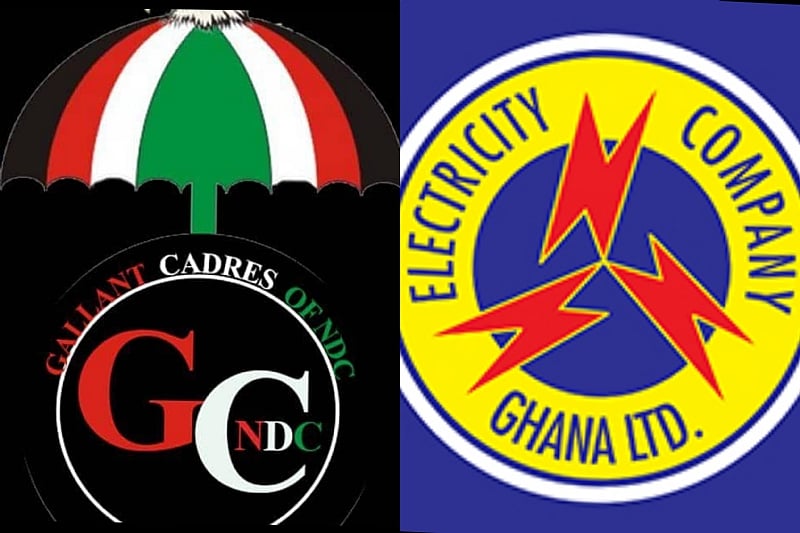The Gallant Cadres of the National Democratic Congress (NDC) have vehemently condemned a proposed 225% electricity tariff hike by the Electricity Company of Ghana (ECG), labeling it as “robbery and criminal in nature.” The Cadres argue that the justifications presented by ECG, including rising inflation, exchange rate fluctuations, and the need to recoup investment costs, are insufficient and serve as a thinly veiled attempt to undermine the John Dramani Mahama administration and sow discontent against the NDC. Instead of approving the tariff increase, which would exacerbate economic hardships, the Cadres urge the government to prioritize retrieving missing ECG containers, purportedly worth millions of dollars. They also criticize the Ministry of Energy for its perceived complicity in the matter, alleging a failure to address persistent leakages within the energy sector and questioning whether such actions are conducive to building public trust in the NDC.
The Cadres’ statement highlights the broader context of proposed utility tariff hikes across the board, with Ghana Water proposing a 281% increase, NEDCo proposing 171%, and VRA demanding a 59% increase. They emphasize the need for any tariff adjustments to be “normalized” to mitigate the impact on ordinary Ghanaians. Their concern extends beyond electricity to the overall state of the energy sector, citing issues like cable theft, the efficacy of energy sector levies, and a fuel consumption charge. They also underscore the disparity between rising tariffs and the quality of service delivery, pointing to significant losses in the system due to long transmission distances and a lack of investment in alternative energy sources like solar power. Furthermore, they criticize the government’s failure to implement energy-saving technologies in public institutions and address the issue of non-payment by large-scale consumers.
The Cadres delve into the historical context of Ghana’s utility management, alleging decades of mismanagement, inflated contracts, deferred maintenance, and politically motivated tariff manipulation to maintain a façade of stability. They argue that this legacy has led to a crumbling infrastructure, unsustainable debt levels, and vulnerability to creditor demands. They use the example of water supply, highlighting the impact of galamsey (illegal mining) on water quality and treatment costs, forcing consumers to bear the burden while polluters remain largely unaccountable. They also point to ECG’s high system losses due to theft and outdated infrastructure as a prime example of mismanagement being passed on to consumers through increased tariffs.
Their critique extends to Ghana Gas, which is seeking a 91% increase in tariffs, attributing the situation to opaque contracts that benefited a select few at the expense of the nation. Even the Volta River Authority, once a symbol of national progress, now requires a 59% tariff hike to maintain operations, illustrating a pattern of underinvestment and fiscal irresponsibility. The Cadres lament the squandered opportunities of the past eight years, citing the inconsistent application of the Cash Waterfall Mechanism, the controversial relocation of the AMERI plant, and the failed PDS concession as examples of missed chances for reform. They also criticize the government’s handling of the debt exchange program, particularly its impact on pensioners.
The Cadres argue that the burden of these historical failures disproportionately affects the most vulnerable members of society, from market traders to families struggling with basic necessities. They contrast this with the relative impunity of those responsible for the mismanagement, including corrupt officials, negligent executives, and complicit politicians. While acknowledging the challenging inheritance of the new government, the Cadres insist that there is a path towards a more just and sustainable future. They advocate for addressing inefficiencies, reducing system losses, holding polluters accountable, recovering stolen assets, and renegotiating unfavorable contracts. Crucially, they emphasize the importance of ensuring that those responsible for the current predicament, not the innocent citizens, bear the consequences.
The core of their argument revolves around the concept of justice. They argue that the proposed tariff hikes are not merely a matter of cost recovery but a reflection of systemic injustice where the poor are perpetually forced to pay for the mistakes of the privileged. They call on the government to break this cycle and establish a new covenant between the government and the governed, one where the burden of past mismanagement is not unjustly shouldered by the powerless. They believe that the government faces a critical choice: perpetuate a system that prioritizes short-term political expediency over the long-term well-being of its citizens, or embark on a path of genuine reform, accountability, and equitable distribution of burdens.
Ultimately, the Gallant Cadres’ statement is a plea for a fundamental shift in how Ghana manages its utilities and resources. They argue that the current crisis is not simply a technical or financial issue, but a moral one, demanding a commitment to justice, transparency, and accountability. They believe that ensuring access to essential services like water and electricity at affordable prices is not just a matter of economic policy, but a fundamental human right that must be protected and prioritized by the government. They call for a future where the burden of history does not continue to fall on the shoulders of the powerless, but where the responsibility for past mistakes is fairly apportioned and where the benefits of progress are shared equitably among all citizens.


